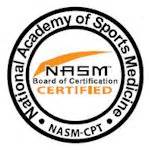CPT (Certified Personal Trainer) from NASM (National Academy of Sports Medicine) by Coach Blaser
A certification in personal training implies that one is knowledgeable in exercise science (anatomy, physiology, biomechanics, neuromuscular control), exercise principles (volume, intensity, frequency), program design (micro-, meso-, and macro-cycles), and a limited scope of nutritional information. NOTE: personal trainers are NOT registered dieticians, and therefore cannot provide clients with comprehensive meal plans.
PROS:
- Exercise Science Education: Basis of information for exercise with all populations based on scientific knowledge and the latest research.
- Opportunity: Personal training is a growing industry; it’s easier to find jobs or start your own business with this certification.
- Growth: Most certification companies provide continuing education and/or specialized certification opportunities; which means that trainers can stay up to speed on the newest information, and learn about different areas of fitness in depth.
CONS:
- Price: for NASM (National Academy of Sports Medicine), the exam plus preparation materials can cost anywhere from $500-$2400. Plus, there is a two-year re-certification fee. Most other certification companies are in the same ballpark for exams and study materials, and may require more or less CEUs (Continuing Education Units)
- Requirements: High school diploma or GED, CPR/AED certification, and a valid ID are the minimum requirement for most organizations, although most don’t require much more than that. I have two problems with these requirements: #1. I’ve found that having a four-year degree in exercise science has been a tremendous help in understanding the scientific basis of exercise, and think it would afford trainers a higher credibility with employers and clients. #2. It is rare for most fitness certifications to require experiential hours, but I think that they are very important. I highly recommend that anyone pursuing a personal training certification accrues shadowing hours; they will help with the transition from textbook to real life.
There are about fifteen organizations with personal training certifications in the US…so why NASM? I sort of fell into my certification with NASM during my senior year of college, when I was finishing up my degree in Exercise and Sport Science. NASM happens to have their research laboratories based at UNC, and offered a discount for students taking an Exercise Principles course. Our textbook for that course was the NASM CPT prep book, and my professor provided excellent hands-on opportunities for my class to understand the principles and practice our skills.
While I may not have been 100% intentional in my choice of certification organization, there are a number of reasons why I am glad to have received my certification from NASM: the OPT model, credibility, and continuing education opportunities. The OPT model is NASM’s guide to exercise; how to create a program for optimum performance. It’s awesome, and it works. Credibility is also huge. Fitness certifications are one of the less regulated certifications out there, and not all certification organizations are viewed equally. NASM is considered one of the best, and it has been a highlight on my resume. The continuing education opportunities are great too! In personal training, finding a niche is very helpful in attracting clientele. Specialized certifications and required CEUs allow trainers to expand, specify, and grow in knowledge and techniques. NASM has excellent courses and many opportunities to become a better trainer.
For strength coaches, a certification in personal training is a great jumping off point for other, more specified certifications. With companies like NASM, ACSM, and ACE, trainers are educated about the science behind everything. Also, techniques for assessments, foam rolling, and cardiovascular training can help coaches assist athletes more holistically. The other nice thing about being a strength coach and having a personal training certification is slightly more practical: the business. As we learned in CEO Strength Coach Series this past spring, it is not easy to get a job in strength and conditioning. Personal training is a great way to supplement income while staying sharp on training knowledge. The exposure to a diverse population is also a great learning experience.
My final thoughts on this topic: If you’re looking to become a strength and conditioning coach, consider getting a personal training certification first. Not only is it a good business move, but it’s also a great basis of knowledge to have before specifying into weight lifting, etc.—especially if you don’t have a degree in the field. However, I do implore you: please do not get this certification just because you can pass the test. People need trainers who are passionate and well-educated from research and experience. Anyone can read a book and take a test, but it takes genuine passion and a deep understanding to effectively plan and execute programs for individuals. Be passionate, and train safely and effectively.
Have you received this certification or considered getting it? If so, could you add a comment for Coach Blaser below? Our team of bloggers would like to know your feedback. When you submit a comment our goal is to post it within 24 hours. Thanks for your feedback!
“The views, opinions, and judgments expressed in this message are solely those of the authors and peer reviewers. This content has been reviewed by a team of contributors but not approved by any other outside entity including the Roman Catholic Diocese of Raleigh.”


